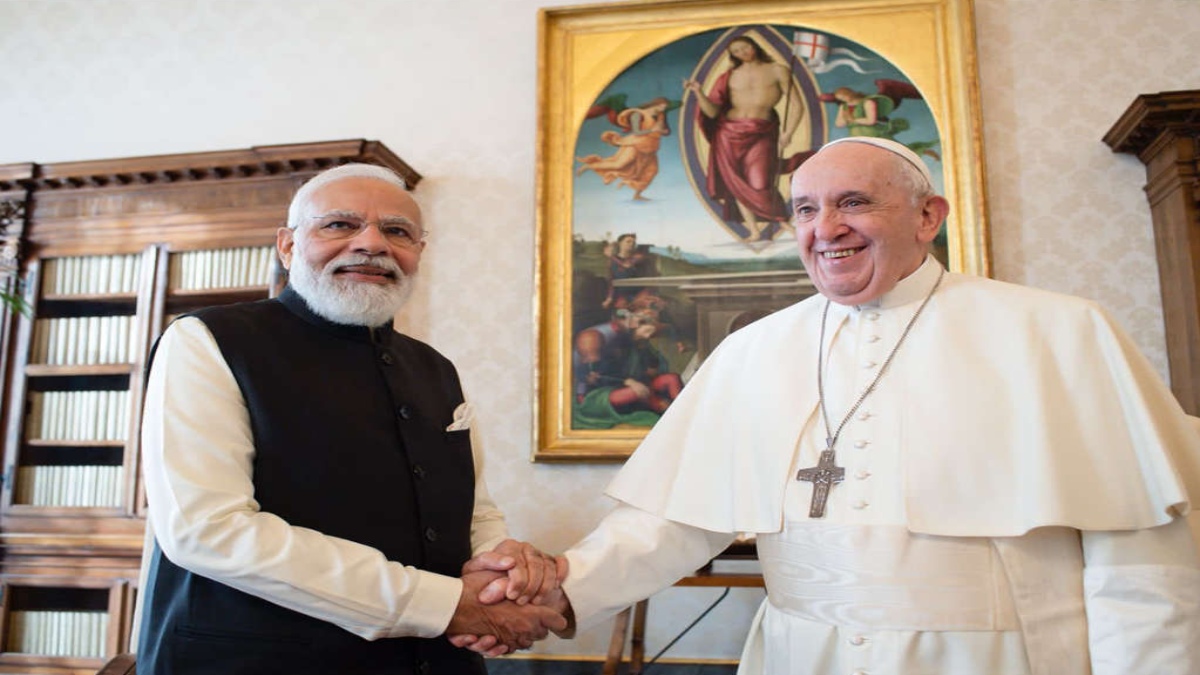


From all accounts, Prime Minister Narendra Modi’s meeting with the head of the Catholic Church, Pope Francis went very well. The 20-minute scheduled meeting lasted for over an hour, during which a range of issues was discussed, including the Covid-19 pandemic, alleviation of poverty and climate change. The optics too were just right. The head of the government of the world’s largest democracy and the spiritual head of the largest Christian church in the world, with over a billion followers, greeted and embraced each other cordially, and thus sent out the right signals of mutual respect, friendship, amity and brotherhood. It was also a message to the world that India is inclusive and cares for its minorities, and any attempt to build a narrative to the contrary is nothing but spreading pure canard.
Those who have been looking at the meeting from the perspective of elections in India, especially in terms of Kerala and Goa, both of which have a substantial Catholic population, are being short-sighted. The meeting was more about India, which, if its critics have to be believed, is sliding down the scale of democracy and is now an “electoral autocracy”. Such a narrative aims to delegitimize India’s electoral process, just because Indians have elected a personality and a party who are comfortable with and are open about their religious identity. Such is the hatred for the Prime Minister among the illiberal and undemocratic left-liberals that they not only demonise the Prime Minister, but also the majority community for electing and then re-electing him. Any display of religiosity as part of the Indian Hindu identity is being taken as an expression of supremacism and thus inherently intolerant and a sign of bigotry, with commentators looking into the Nazi era to find spurious similarities. The truth is, if India is “secular” it is because of the majority religion whose followers believe in inclusivity. A base attempt is being made to draw a false equivalence with the situation in India with that of its neighboring countries where the minority population not only faces discrimination but is being systematically wiped out, which is apparent from the way their numbers have been dwindling. In contrast, the numbers in India have been going up. Discrimination against minorities has been institutionalised in these countries, unlike India, where there is no systematic discrimination against the minorities.
As for the attacks on the Prime Minister, the less said the better. Not only are these offensive but also outlandish, with bizarre comparisons being made with some of history’s worst offenders. A minor incident taking place even in a state ruled by an Opposition party is laid directly at the Prime Minister’s door. No western legacy media will start their article on India without reminding the readers that PM Modi is a “Hindu nationalist”—with nationalism used in a very negative western concept of exclusivity, where there is no place for the “other”. In a stark display of hypocrisy, Xi Jinping is never described as the Communist dictator Xi Jinping or Pakistan Prime Minister as an Islamic nationalist or terrorist sympathizer—Osama Bin Laden is a martyr, he had said—and a bigot, even though both their records are sullied by the inhuman treatment meted out to the minorities in their respective countries.
In contrast, the Indian Prime Minister has made development his goal, with sabka saath, sabka vikas the mantra of his governance right from the day he assumed power in 2014. He has also been vocal against incidents of attacks against the minorities. But why let truth come in the way when concocting a fiction? It is in this context that the meeting with the Pope has to be seen. It is not known if the Pope raised any questions about the well-being of the minorities in this country. But even if he did, the Prime Minister would have cleared his “doubts”.
The meeting can also be viewed as an important outreach to the Christian community—and minorities in general—in India and would have cleared many misgivings in their minds if they had any. India has not changed in the last seven years that the PM has been in power. It is as inclusive as ever. Religious bigotry does not have a place in India, the minorities are secure here—this was the broader message of the Prime Minister’s meeting with the Pope.